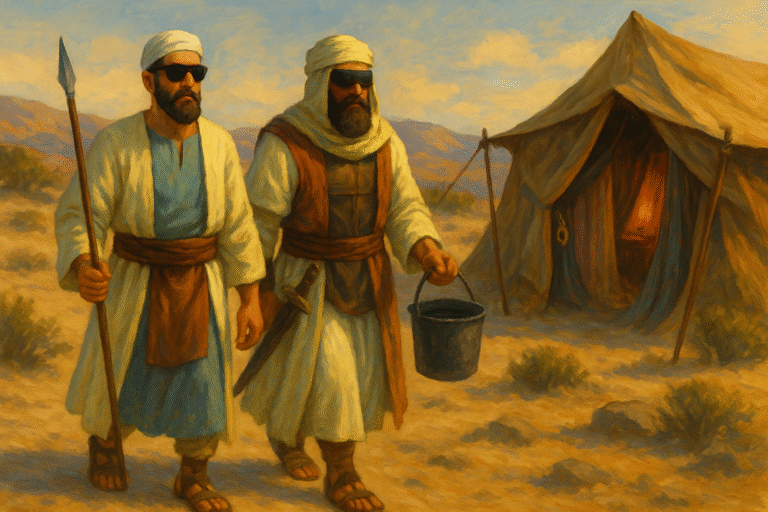Yishmael's Teshuvah

Avraham's Little-Known Role in Helping His Son Do Teshuvah
You may already know that Yishmael did teshuvah during the lifetime of his father and that he lived out the rest of his days as a righteous man. But do you know the circumstances that led to his decision to turn his life around and return to the path of kedushah?
First of all, how do we even know that Yishmael did teshuvah, let alone in Avraham's lifetime? We know from Bereshit 25:17: וְאֵלֶּה שְׁנֵי חַיֵּי יִשְׁמָעֵאל מְאַת שָׁנָה וּשְׁלֹשִׁים שָׁנָה וְשֶׁבַע שָׁנִים וַיִּגְוַע וַיָּמׇת וַיֵּאָסֶף אֶל־עַמָּיו (And these are the years of the life of Yishmael, one hundred years and thirty years and seven years, and he expired and he died and he was gathered to his people). How does this prove that he did teshuvah? The Gemara in Bava Batra 16b records a conversation between two Amoraim where this very question came up. Rav Chama bar Buzi told Ravina that any place where גְּוִיעָה [geviah, expired] and אֲסִיפָה [asifah, gathered] are both used to describe someone's death, it comes to inform us that the person was a tzaddik. So although this pasuk teaches that Yishmael did teshuvah and became a tzaddik, it doesn't tells us that he did teshuvah during Avraham's lifetime. How do we know this additional fact? Rava, who was listening to this conversation, told them that we learn it from the Torah's description of Avraham's burial (Bereshit 25:9): וַיִּקְבְּרוּ אֹתוֹ יִצְחָק וְיִשְׁמָעֵאל בָּנָיו אֶל־מְעָרַת הַמַּכְפֵּלָה (And Yitzchak and Yishmael, his sons, buried him in the Cave of Machpelah). We learn two facts from these words. First, we learn that Yitzchak preceded Yishmael even though he was not the firstborn. Second, we learn that since it describes both of them as 'sons', it teaches us that just as Yitzchak was a righteous son of Avraham, so too was Yishmael. Rashi summarizes these two ideas and writes: מִכָּאן שֶׁעָשָׂה יִשְׁמָעֵאל תְּשׁוּבָה וְהוֹלִיךְ אֶת יִצְחָק לְפָנָיו, וְהִיא שֵׂיבָה טוֹבָה שֶׁנֶּאֱמַר בְּאַבְרָהָם (From here, [we learn] that Yishmael did teshuvah, and he allowed Yitzchak to precede him, and this is the 'good old age' that is said about Avraham).
What is this 'good old age' about which Rashi is commenting? It is explained in Bereshit Rabbah 38: דְּאָמַר רַבִּי יוּדָן מִשּׁוּם רַבִּי אַבָּא בַּר כַּהֲנָא: וְאַתָּה תָּבוֹא אֶל אֲבֹתֶיךָ בְּשָׁלוֹם, בִּשְּׂרוֹ שֶׁיֵּשׁ לְאָבִיו חֵלֶק לָעוֹלָם הַבָּא: תִּקָּבֵר בְּשֵׂיבָה טוֹבָה, בִּשְּׂרוֹ שֶׁיִּשְׁמָעֵאל עוֹשֶׂה תְּשׁוּבָה (And R' Yudan said in the name of R' Abba bar Kahana, 'And you shall go to your fathers in peace' [Bereshit 15:15] – with this good news, [Hashem told Avraham] that his father [Terach] has a share in Olam ha-Ba. 'You will be buried at a good old age' [Bereshit 15:15] – with this good news, [He told him] that Yishmael will do teshuvah).
Let's back up the story further and ask another question. From where do we learn that Yishmael had become a sinner in need of teshuvah? We learn it from the events surrounding the festive banquet held in Yitzchak's honor (Bereshit 21:8): וַיִּגְדַּל הַיֶּלֶד וַיִּגָּמַל וַיַּעַשׂ אַבְרָהָם מִשְׁתֶּה גָדוֹל בְּיוֹם הִגָּמֵל אֶת־יִצְחָק (And the child grew, and he was weaned, and Avraham made a great banquet on the day that Yitzchak was weaned). Although there are differences of opinion as to when this celebration took place (see below), Rashi's opinion is that it took place after 24 months had passed in Yitzchak's life.
But all was not well. Sarah saw things that would change the course of history (Bereshit 21:9): וַתֵּרֶא שָׂרָה אֶת־בֶּן־הָגָר הַמִּצְרִית אֲשֶׁר־יָלְדָה לְאַבְרָהָם מְצַחֵק (And Sarah saw the son of Hagar the Egyptian whom she bore to Avraham metzachek). What does this word metzachek mean? Rashi explains that it includes three sins: גִּלּוּי עֲרָיוֹת [galui arayot, forbidden relations], עֲבוֹדָה זַרָה [avodah zarah, idol worship] and רְצִיחָה [retzichah, murder]. The midrash in Bereshit Rabbah 53 spells this out in detail and directly states that Sarah witnessed Yishmael doing all of these terrible things.
Perhaps you're asking yourself, Why should we even care about Yishmael? The answer is because he is the paradigm of a teenage son who 'goes off the derech'. According to Rashi at least, he was 15 years old at the time of this party, having been born 13 years ahead of Yitzchak.
Therefore, we should ask ourselves another question. Why did Yishmael plunge himself into a life of moral degeneracy? We learn what was at the root of his behavior from Sarah's words (Bereshit 21:10): וַתֹּאמֶר לְאַבְרָהָם גָּרֵשׁ הָאָמָה הַזֹּאת וְאֶת־בְּנָהּ כִּי לֹא יִירַשׁ בֶּן־הָאָמָה הַזֹּאת עִם־בְּנִי עִם־יִצְחָק (And she said to Avraham, Divorce this woman along with her son, for the son of this woman will not inherit with my son, with Yitzchak). Yishmael's struggle, the core issue that he had difficulty accepting, that hurt him deeply and drove him into rejecting the path of righteousness, was that he was not going to inherit his father, i.e. that in some way he was 'not as good' as his half-brother.
Sarah's words were also very difficult for Avraham to accept (Bereshit 21:11): וַיֵּרַע הַדָּבָר מְאֹד בְּעֵינֵי אַבְרָהָם עַל אוֹדֹת בְּנוֹ (And these things were very grievous in the eyes of Avraham, on account of his son). Not on account of Hagar, but on account of his son. This shows us that Avraham loved Yishmael deeply. Citing the midrash in Shemot Rabbah 1, Rashi explains Avraham's grief in two ways: שֶׁשָּׁמַע שֶׁיָּצָא לְתַרְבּוּת רָעָה וּפְשׁוּטוֹ עַל שֶׁאָמְרָה לוֹ לְשַׁלְּחוֹ (He heard that he [Yishmael] had gone off the derech [literally: 'to evil culture'], and it's simple meaning is because she [Sarah] said to him [Avraham] to send him [Yishmael] away).
Hashem attempted to assuage Avraham's feelings of grief, but in the end He just had to tell him (21:12): כֹּל אֲשֶׁר תֹּאמַר אֵלֶיךָ שָׂרָה שְׁמַע בְּקֹלָהּ כִּי בְיִצְחָק יִקָּרֵא לְךָ זָרַע (Everything that Sarah said to you, listen to her voice, for in Yitzchak [i.e. not in Yitzchak and in Yishmael] shall your seed be called). Here, we can learn something truly astonishing about shalom bayit and the greatness of Avraham Avinu. The Radak explains Avraham's acceptance of Sarah's instructions in more details: כי אפילו לאחרים היה מלמד ומדריך בדרך טובה כל שכן לבנו, והיה רע בעיניו שיגרשהו מביתו, ולא גער באשתו מפני שלום הבית, כמו שכתבנו בדבר הגר, והיה מצטער על הדבר, והיה סובל מריבת אשתו עד שבא אליו הדבור (Even though Avraham taught and guided [everyone] in the good way, all the more so [he taught] his son [Yishmael], and it was 'evil in his eyes' that he expelled him from his house, but he didn't rebuke his wife because of shalom bayit, like we wrote [earlier regarding] the incident with Hagar, and he was sorry for doing this thing, and he suffered this quarrel with his wife until the dibbur [the word of Hashem] came to him). What an amazing example of self-control!
Avraham got up early in the morning (as was his custom) and composed two legal documents. First, he wrote a will in favor of Yitzchak making him the sole inheritor of Hashem's promises. Then he wrote a get for Hagar (Pirkei d'Rabbi Eliezer 30). Handing her the get, he drove her away with some bread and a jug of water tied on one of her shoulders and Yishmael tied on her other shoulder (see Rashi on Bereshit 21:14 and the Toledot Yitzchak). Yishmael protested strenuously as he did not want to be separated from his father. Nothing Avraham did or said was able to soothe Yishmael's grief. Finally, to get Yishmael to follow his mother, he had to literally tie him to her shoulder. Rashi adds that Yishmael got so sick that he couldn't even walk. Hagar was not a young woman herself at this time, so just imagine how difficult it was for her! Perhaps this sheds a little light on her seemingly strange conduct in v .15: וַתַּשְׁלֵךְ אֶת־הַיֶּלֶד תַּחַת אַחַד הַשִּׂיחִם (And she threw the boy under one of the shrubs).
There are many more aspects to this story; yet, we have brought down these particular details to highlight the strong bond of love and affection between Yitzchak and his father. More than likely, this is why Yehudah ben Tema said (Pirkei d'Rabbi Eliezer 30): וּמִכָּל הָרָעוֹת שֶׁבָּאוּ עַל אַבְרָהָם הֵרַע בְּעֵינָיו הַדָּבָר הַזֶּה מְאֹד (And more than all of the terrible things that came upon Avraham, this was the very worst). That's quite a statement, and he means to say that it was even more difficult than the Akeidah.
Now we come to our purpose, for everything we have written above is only the introduction. As stated above, there are differences of opinion regarding Yishmael's age when he left his father's house. According to Pirkei d'Rabbi Eliezer 30, he was either 24 or 27 years old, having understood that the grand banquet that Avraham made for Yitzchak was more likely in honor of his bar mitzvah than it was in honor of his weaning. Keep this in mind as we continue our story because we'll be drawing from this account.
Avraham missed his son terribly and yearned to see him. After three long years, Sarah agreed to let him go on one condition – that he not come down off his camel in any place where Yishmael might be found. She insisted that he swear an oath on this point. What kind of a stipulation was this? She wanted it to appear to Yishmael as if it was just a chance visit, a random encounter and not a planned trip. Why? She understood the mutual affection that they had for each other, and she knew that Avraham wanted to help his son do teshuvah. So what? Would that have been a terrible thing? No, but she was concerned that Avraham would convince his son to return home. But there was another issue. She also understood the potential danger in doing kiruv. Who would persuade whom? After all, when a strong force of good encounters a strong force of evil, the outcome is not a foregone conclusion. In the end, Avraham agreed and swore that he wouldn't get down off his camel.
In the meantime, Yishmael had married a Moavite woman by the name of Aishah. Avraham set off on his journey and showed up at Yishmael's home at noon, during the heat of the day. He found Aishah there and asked her if Yishmael was at home. She told him that he was out in the desert with his mother looking for fruits and dates to bring home to eat. Avraham politely asked for a little water and bread explaining that he was exhausted and faint from having traveled across the desert for an extended period of time. She snapped back at him and told him that she had nothing to give him. Before leaving, Avraham asked that she tell her husband the following message: זָקֵן אֶחָד מֵאֶרֶץ כְּנַעַן בָּא לִרְאוֹתְךָ וְאָמַר: חַלֵּף מִפְתַּן בֵּיתְךָ, שֶׁאֵינָהּ טוֹבָה לְךָ (An old man from the Land of Cana'an came to see you, and he said, 'Exchange the threshold of your house, for it's not good for you'). Not understanding the gist of Avraham's words, she obediently conveyed this message to Yishmael after he returned home that night. As Pirkei d'Rabbi Eliezer says: וּבֵן חָכָם כַּחֲצִי חָכָם (A son of a sage is like a half-sage). Realizing the truth of his father's words, Yishmael promptly divorced her. He then sent his mother to her former royal home in Egypt to find a more appropriate wife for him. Hagar returned with a woman named Fatima.
Three years later, Avraham's yearnings for his son overwhelmed him again, and once again Sarah insisted that he agree to the same stipulation that he had agreed to three years earlier. Events began much like they did before. Avraham showed up at noon, in the heat of the day. This time, he found Fatima and asked her if Yishmael was at home. She told him that Yishmael and her mother were out in the desert feeding his camels – quite an upgrade from foraging for fruits and dates in the desert. What's the point? Financial blessings typically descend upon a home through the goodness of the wife.
After explaining that he was exhausted and faint from a long journey, she quickly brought out bread and water for him. Immediately, Avraham prayed that as a result of the chesed and hospitality that now existed within Yishmael's house, Hashem would fill his son's home with all manner of blessings. When Yishmael returned home that night, Fatima told him what happened, and he was overjoyed to learn that the heart of his father was still toward him with love. He came to know the truth of what David ha-Melech eventually immortalized in Tehillim 103:13: כְּרַחֵם אָב עַל־בָּנִים רִחַם יְיָ עַל־יְרֵאָיו (Just as a father acts with compassion toward his sons, Hashem is compassionate upon those who revere Him).
And this is how Yishmael began to do teshuvah – all because Avraham lived the truth in Mishlei 10:12: שִׂנְאָה תְּעֹרֵר מְדָנִים וְעַל כׇּל־פְּשָׁעִים תְּכַסֶּה אַהֲבָה (Hatred awakes strife, but love covers over all crimes).







The question, for me, isn't "did Yishmael do teshuva", but "why didn't his progeny follow him?"
It's probably a complicated answer, but I haven't seen it anywhere yet.
Very good question. And you're right, it would require an lengthy response to address it properly. In brief, Yishmael was an anomaly in history. For example, compare him with Esav. Yishmael rose to a very high level and personally achieved greatness — perhaps even against the odds, so to speak. Even though he purified himself, this was not an expectation of his children. They did not have the yichus that he had. Another factor is that Yishmael was Avraham's son and grew up in his household, which was not the case with Yishmael's children. They grew up with Yishmael and their mothers. So his children never really experienced the kedushah of Avraham and Sarah. Even as Chazal say of Rivka compared to her husband Yitzchak. There is no comparing a tzadik son of a tzadik with a tzadik (tzedeket) son (daughter) of a rasha.
I really enjoyed reading this article about their relationship. I never knew how Yishmael did teshuva. Yasher koach! Could you provide sources? Also, from this Torah vort, I wonder if all this hatred against Arabs is warranted, ie, calling them “barbarians” and “terrorists” especially what is happening in Gaza? I have worked with Arabs and they were always respectful and never once felt any hatred front them. What is your opinion?
1. Many of the main sources for him doing teshuvah are in the article.
2. There is a difference between Arabs in general and those Arabs who have indoctrinated with a Nazi culture of hatred. Just because you are acquainted with moderate or civilized Arabs, you would be making a grave mistake to think that other Arabs can't be monsters or demons, because they can be, just like the nice civilized and cultured Germans of the 1930s and 1940s.
You point out that Hashem told Avraham to listen to his wife Sara regarding expelling Yishmael and Hagar from their household. Avraham complied even though he was greatly troubled by this as he loved his firstborn son. This is in chapter 21.
וַיֹּ֨אמֶר אֱלֹהִ֜ים אֶל־אַבְרָהָ֗ם אַל־יֵרַ֤ע בְּעֵינֶ֙יךָ֙ עַל־הַנַּ֣עַר וְעַל־אֲמָתֶ֔ךָ כֹּל֩ אֲשֶׁ֨ר תֹּאמַ֥ר אֵלֶ֛יךָ שָׂרָ֖ה שְׁמַ֣ע בְּקֹלָ֑הּ כִּ֣י בְיִצְחָ֔ק יִקָּרֵ֥א לְךָ֖ זָֽרַע׃
Why he accepted this difficult command can be seen in a hint given to us in chapter 16.
Perek 16
וַתֹּ֨אמֶר שָׂרַ֜י אֶל־אַבְרָ֗ם הִנֵּה־נָ֞א עֲצָרַ֤נִי יְהֹוָה֙ מִלֶּ֔דֶת בֹּא־נָא֙ אֶל־שִׁפְחָתִ֔י אוּלַ֥י אִבָּנֶ֖ה מִמֶּ֑נָּה וַיִּשְׁמַ֥ע אַבְרָ֖ם לְק֥וֹל שָׂרָֽי׃
וַתִּקַּ֞ח שָׂרַ֣י אֵֽשֶׁת־אַבְרָ֗ם אֶת־הָגָ֤ר הַמִּצְרִית֙ שִׁפְחָתָ֔הּ מִקֵּץ֙ עֶ֣שֶׂר שָׁנִ֔ים לְשֶׁ֥בֶת אַבְרָ֖ם בְּאֶ֣רֶץ כְּנָ֑עַן וַתִּתֵּ֥ן אֹתָ֛הּ לְאַבְרָ֥ם אִישָׁ֖הּ ל֥וֹ לְאִשָּֽׁה׃
וַיָּבֹ֥א אֶל־הָגָ֖ר וַתַּ֑הַר וַתֵּ֙רֶא֙ כִּ֣י הָרָ֔תָה וַתֵּקַ֥ל גְּבִרְתָּ֖הּ בְּעֵינֶֽיהָ׃
וַיִּשְׁמַ֥ע אַבְרָ֖ם לְק֥וֹל שָׂרָֽי׃
Hashem may have said to Avraham , "When Sara offered Hagar to be your wife in order for you to sire a child, YOU LISTENED TO HER. Yishmael would not even have existed if you hadn't paid attention to your wife's words. Now listen to her again.
כֹּל֩ אֲשֶׁ֨ר תֹּאמַ֥ר אֵלֶ֛יךָ שָׂרָ֖ה שְׁמַ֣ע בְּקֹלָ֑הּ
I believe you are mistaken comparing Arabs to Nazis. If you want to know who are real Nazis today just do a Google search of the Ukrainian Azov gang. They are cruel and virulently anti-semitic.
I suggest you read The Empty Wagon by Rabbi Yaakov Shapiro. He wrote a very informative and detailed history of the creation of Zionism and how the Zionists viciously displaced and murdered Arabs before and during the war of independence. Their cruelty was very similar to Nazis. Today, the Zionist are committing atrocities in Gaza and Lebanon in our name. A grave chillul Hashem!
Isn't it peculiar that another "Aisha" was Muhammad's most-beloved wife according to some Islamic opinions.
In fact, several opinions even state she was the only one privy to some of his so-called "spiritual revelations" and was integral to the early spread of Islam following Muhammad's death, going so far as to "interpret" many of her late husband's teachings.
It makes you wonder who was really running the show, I mean, jihad.